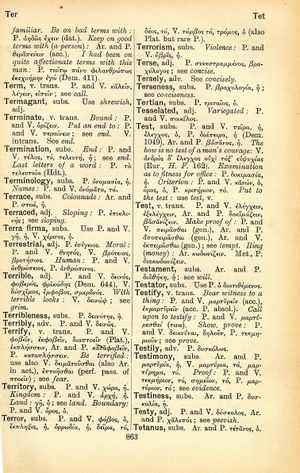testator: Difference between revisions
From LSJ
αὐτόματοι δ' ἀγαθοὶ ἀγαθῶν ἐπὶ δαῖτας ἴασι → automatically do the noble go to the feasts of the noble
(3_13) |
(3) |
||
| Line 12: | Line 12: | ||
{{Georges | {{Georges | ||
|georg=tēstātor, ōris, m. ([[testor]]), I) der [[Zeuge]], Prud. cath. 12, 87. – II) der Testierer, [[Testator]], Suet. u.a. | |georg=tēstātor, ōris, m. ([[testor]]), I) der [[Zeuge]], Prud. cath. 12, 87. – II) der Testierer, [[Testator]], Suet. u.a. | ||
}} | |||
{{LaEn | |||
|lnetxt=testator testatoris N M :: testator; one who makes a will; witness, one who testifies (L+S) | |||
}} | }} | ||
Revision as of 21:55, 27 February 2019
English > Greek (Woodhouse)
subs.
Use P. ὁ διατιθέμενος.
Latin > English (Lewis & Short)
testātor: ōris, m. testor.
I One who bears witness or testifies to a thing, a witness (very rare), Prud. Cath. 12, 85.—
II One who makes a will or testament, a testator (the predom. jurid. signif. of the word, but not in Cic.), Dig. 28, 3, 17; 31, 1, 89; Suet. Ner. 17; Lact. 4, 20 al.
Latin > French (Gaffiot 2016)
testātŏr,¹⁶ ōris, m. (tester),
1 celui qui rend témoignage : Prud. Cath. 12, 87
2 testateur : Suet. Nero 17 ; Dig. 38, 3, 17.
Latin > German (Georges)
tēstātor, ōris, m. (testor), I) der Zeuge, Prud. cath. 12, 87. – II) der Testierer, Testator, Suet. u.a.
Latin > English
testator testatoris N M :: testator; one who makes a will; witness, one who testifies (L+S)

